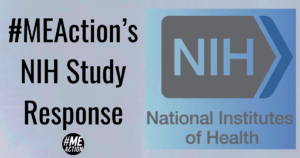Editor’s note – this is an emerging news story. Edits will continue to be made to this page as we receive more details.
The National Institutes of Health (NIH) announced today that it will undertake a new clinical study and “reinvigorate” the long-standing trans-NIH working group to further ME/CFS research, an effort to be led by the National Institute of Neurological Disorders and Stroke (NINDS):
In an effort to remedy this situation, NIH will design a clinical study in the NIH Clinical Center with plans to enroll individuals who developed fatigue following a rapid onset of symptoms suggestive of an acute infection. The study will involve researchers from NINDS, the National Institute of Allergy and Infectious Diseases, National Institute of Nursing Research and National Heart, Lung, and Blood Institute. The primary objective of the study is to explore the clinical and biological characteristics of ME/CFS following a probable infection to improve understanding of the disease’s cause and progression.
NIH will also be considering additional ways to support ME/CFS research in the extramural research community. Since the root cause of ME/CFS is unknown and the manifestations of the disorder cut across the science interests of multiple NIH institutes and centers, a trans-NIH working group will be needed to assist that plan. NINDS Director Walter J. Koroshetz, M.D., will chair the Working Group along with Vicky Holets Whittemore, Ph.D., the NIH representative to the U.S. Department of Health and Human Services’ Chronic Fatigue Syndrome Advisory Committee. One goal of the group will be to explore how new technologies might shed light on what causes ME/CFS. The Working Group includes representation from 23 NIH institutes, centers and offices.
“Of the many mysterious human illnesses that science has yet to unravel, ME/CFS has proven to be one of the most challenging,” said NIH Director Francis S. Collins, M.D., Ph.D. “I am hopeful that renewed research focus will lead us toward identifying the cause of this perplexing and debilitating disease so that new prevention and treatment strategies can be developed.”
This announcements comes after a growing consensus around the seriousness of the disease and recommendations from the Institute of Medicine, and the NIH’s Pathways to Prevention, and the Chronic Fatigue Syndrome Advisory Committee (CFSAC) to increase research at the NIH.
While not made explicit in this press release, a source at the NIH confirmed that this means that ME/CFS will no longer be housed under the Office of Women’s Health but has not been formally moved to NINDS.
It also comes after a growing wave of pressure from the patient community, including Brian Vastag’s open letter to NIH Director Francis Collins in the Washington Post, the #MEAction funding equality petition, a letter from several ME and CFS organizations to Francis Collins and Secretary Burwell; congressional actions like #MEAction’s 21st Century Cures initiative and MEAdvocacy’s call for congressional leadership on the issue; as well as the individual efforts of countless other advocates.
This is a step in the right direction, but it’s only it is only a first step. It is far from meeting the vast need or our goal of $250 million per year in research funding. There was no mention of a new Program Announcement, Request for Applications (RFA) or other specific plans for promoting extramural research. (Update: Collins is apparently telling some patient activists that extramural funding will also increase, with more to be announced in the coming weeks.) There was also no mention of Centers of Excellence. They have also not explained how we figure into their strategic planning process or the $3.75 billion in new appropriations that the NIH may receive in 2016. There is a lot of work still to be done. We need to keep the pressure on, keep building the momentum, and continue to grow the size and organization of our movement.
Here’s what you can do:
- Sign and share the #MEAction funding equality petition.
- Join an #MEAction group or start your own. Let’s keep building the capacity of our army!
News coverage of the announcement:
- “NIH announces new effort to tackle chronic fatigue syndrome,” Washington Post
- “A boost for chronic fatigue syndrome research,” The Atlantic
- “NIH refocuses research into chronic fatigue syndrome“, Science






4 thoughts on “NIH announces new clinical study and move to NINDS”
Using SEID criteria, as if SEID or CFS are the same as ME, will only futher contaminate the subject group in future studies. The end result will be more bad science like PACE.
There is absolutely no chance of successful Myalgic Encephalomyelitis research taking place unless and until the unholy “MECFS” alliance is broken up. Myalgic Encephalomyelitis is a neurological illness not a syndrome. Calling a condition “MECFS” allows it to be researched by psychiatrists when it should be researched by neurologists. Using two contradictory and mutually exclusive terms as if they were one and the same thing is unscientific and a waste of time and money.
Great news!!! This is a first big step, but still many more to go.
So pleased to hear of this big step in the right direction, I can only hope that in time there will be many more!
Thank you NIH and ME Action Network for all that you do.
Comments are closed.